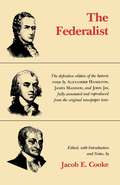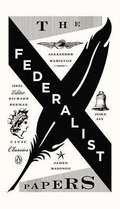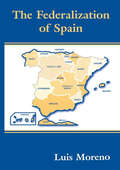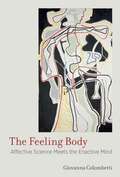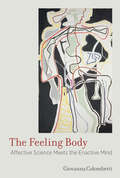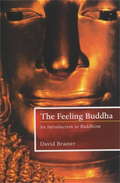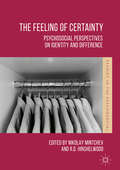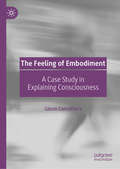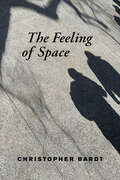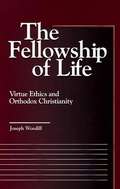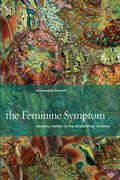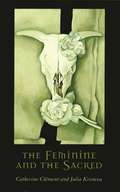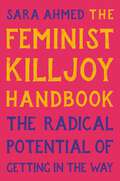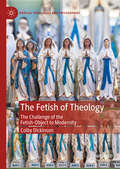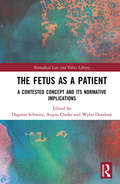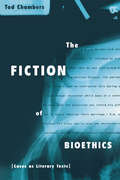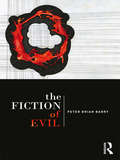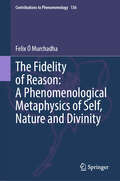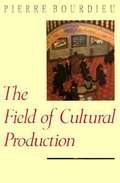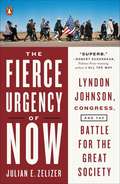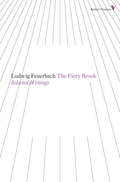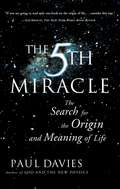- Table View
- List View
The Federalist
by Jacob E. CookeThis edition from a noted historian &“is the first definitive, variorum edition of the text of this much reprinted classic&” (The William and Mary Quarterly). The definitive edition of the historic essays by Alexander Hamilton, James Madison, and John Jay, fully annotated and reproduced from the original text. Also included are a new introduction by historian Jacob C. Cooke, along with notes, a glossary, as well as the complete Articles of Confederation, Declaration of Independence, and U.S. constitution. &“A high-quality, scholarly edition.&” –Library Journal &“Everyone who is interested in either the principles or the practice of government―in the age of the Fathers or in our own era of perplexity―should read it.&” ―Dumas Malone, History Book Club Review
The Federalist Papers
by Alexander Hamilton James Madison John JayThe Federalist Papers are a series of 85 articles encouraging the ratification of the United States Constitution. The Federalist Papers serve as a primary source for interpretation of the Constitution, as they outline the philosophy and motivation for the proposed system of government. Hamilton, Madison and Jay wanted to encourage the ratification and also set the standards for future interpretation of the Constitution. This book is essential for understanding the beginnings of the greatest democracy in the modern world.
The Federalization of Spain (Routledge Studies in Federalism and Decentralization #Vol. 5)
by Luis MorenoTraces the origins of the complex system of devolution and regional home rule that currently shapes and directs the Spanish political process.
The Feeling Body
by Giovanna ColombettiIn The Feeling Body, Giovanna Colombetti takes ideas from the enactive approach developed over the last twenty years in cognitive science and philosophy of mind and applies them for the first time to affective science -- the study of emotions, moods, and feelings. She argues that enactivism entails a view of cognition as not just embodied but also intrinsically affective, and she elaborates on the implications of this claim for the study of emotion in psychology and neuroscience. In the course of her discussion, Colombetti focuses on long-debated issues in affective science, including the notion of basic emotions, the nature of appraisal and its relationship to bodily arousal, the place of bodily feelings in emotion experience, the neurophysiological study of emotion experience, and the bodily nature of our encounters with others. Drawing on enactivist tools such as dynamical systems theory, the notion of the lived body, neurophenomenology, and phenomenological accounts of empathy, Colombetti advances a novel approach to these traditional issues that does justice to their complexity. Doing so, she also expands the enactive approach into a further domain of inquiry, one that has more generally been neglected by the embodied-embedded approach in the philosophy of cognitive science.
The Feeling Body: Affective Science Meets the Enactive Mind (The\mit Press Ser.)
by Giovanna ColombettiA proposal that extends the enactive approach developed in cognitive science and philosophy of mind to issues in affective science.In The Feeling Body, Giovanna Colombetti takes ideas from the enactive approach developed over the last twenty years in cognitive science and philosophy of mind and applies them for the first time to affective science—the study of emotions, moods, and feelings. She argues that enactivism entails a view of cognition as not just embodied but also intrinsically affective, and she elaborates on the implications of this claim for the study of emotion in psychology and neuroscience. In the course of her discussion, Colombetti focuses on long-debated issues in affective science, including the notion of basic emotions, the nature of appraisal and its relationship to bodily arousal, the place of bodily feelings in emotion experience, the neurophysiological study of emotion experience, and the bodily nature of our encounters with others. Drawing on enactivist tools such as dynamical systems theory, the notion of the lived body, neurophenomenology, and phenomenological accounts of empathy, Colombetti advances a novel approach to these traditional issues that does justice to their complexity. Doing so, she also expands the enactive approach into a further domain of inquiry, one that has more generally been neglected by the embodied-embedded approach in the philosophy of cognitive science.
The Feeling Buddha: An Introduction to Buddhism
by David BrazierThis account explains how the Buddha's path of wisdom and loving kindness grew out of the challenges he encountered in life. It explores enlightenment, nirvana, and the Four Noble Truths, presenting a picture of the Buddha as a very human figure whose success lay not in his perfection, but in his method of positively utilizing the energy generated by personal suffering.
The Feeling Buddha: An Introduction to Buddhism
by David BrazierThis account explains how the Buddha's path of wisdom and loving kindness grew out of the challenges he encountered in life. It explores enlightenment, nirvana, and the Four Noble Truths, presenting a picture of the Buddha as a very human figure whose success lay not in his perfection, but in his method of positively utilizing the energy generated by personal suffering.
The Feeling of Certainty
by Nikolay Mintchev R. D. HinshelwoodThis book explores the concept of certainty, a term which is widely used in everyday language to designate a psychological experience or feeling but is rarely considered controversial or politically charged. The Feeling of Certainty argues that conversely this most ordinary of feelings plays a key role in shaping identity formation, social exclusion, prejudice, and commitment to political causes. The authors question what it means for the subject to feel certainty about her or his relationships to self and others. From where does the feeling of certainty originate, and how does it differ from modes of thought that are open to scepticism about the order of things? They draw on a wide range of theories, including those of Freud, Klein, Lacan, Wittgenstein, Bion, and Jung, challenging readers to consider the world of ideologies, symbols, and stereotypes in which certainty is entrenched, as well as the inter- and intra-psychic processes and defence mechanisms which form the unconscious foundation of the experience of certainty. This collection will offer valuable insight to scholars of psychology, politics, social science and history.
The Feeling of Embodiment: A Case Study in Explaining Consciousness
by Glenn CarruthersThis book proposes a novel and rigorous explanation of consciousness. It argues that the study of an aspect of our self-consciousness known as the ‘feeling of embodiment’ teaches us that there are two distinct phenomena to be targeted by an explanation of consciousness. First is an explanation of the phenomenal qualities – 'what it is like' – of the experience; and second is the subject's awareness of those qualities. Glenn Carruthers explores the phenomenal qualities of the feeling of embodiment using the tools of quality spaces, as well as the subject's awareness of those qualities as a functionally emergent property of various kinds of processing of these spaces. Where much recent work on consciousness focuses on visual experience, this book rather draws evidence from the study of self-consciousness. Carruthers argues that in light of recent methodological discoveries, awareness must be explained in terms of the organization of multiple cognitive processes. The book offers an explanation of anomalous body representations and, from that, poses a more general theory of consciousness. Ultimately this book creates a hybrid account of consciousness that explains phenomenology and awareness using different tools. It will be of great interest to all scholars of psychology and philosophy as well as anyone interested in exploring the intricacies of how we experience our bodies, what we are and how we fit into the world.
The Feeling of Space
by Christopher BardtA richly illustrated exploration of humanity’s drive to shape life as a spatial project, from Plato’s time to the digital era.Place is something real, but space is generally conceived as abstract and immaterial. In The Feeling of Space, Christopher Bardt explores this damaging modern binary and traces the contradictory impulses that have dematerialized our sense of space through history: fear and wonder; a yearning for the infinite and intimate; and the need for autonomy and belonging. Using rich illustrations and examinations of art, technology, and philosophy, Bardt argues that if we can get back to first feeling space, then we can treat space as the substance that gives agency to our intersubjectivity—the exchange of conscious and unconscious thoughts we have with others. Expertly connecting ideas with clear examples from lived experiences, Bardt’s revolutionary framework will appeal to a broad readership, particularly those who are interested in the theoretical and philosophical aspects of spaces. In an age where digital media has dissolved, instead of increased, our sense of connection, The Feeling of Space shows that when we learn to experience space as a medium as real as a place, we not only see ourselves as inherently spatialized beings, but we can also rebuild the bonds that tie us together.
The Fellowship Of Life: Virtue Ethics And Orthodox Christianity
by Joseph Woodill James F. KeenanBringing Orthodox Christianity into the recent dialog on virtue ethics, Joseph Woodill investigates the correspondences between the Eastern Orthodox tradition and contemporary virtue ethics, and he develops a distinctly Orthodox vision of theological ethics. This book fills a vacuum in our understanding of the Eastern Church by revealing themes, persons, and insights that offer resources for a contemporary moral theology. Reviewing the Eastern tradition from patristic times to the present, Woodill shows its relevance to contemporary virtue ethics and identifies both differences and similarities between Orthodox and other -- Catholic, Protestant, and Jewish -- virtue ethics.
The Feminine Symptom: Aleatory Matter in the Aristotelian Cosmos
by Emanuela BianchiThe first English-language study of Aristotle’s natural philosophy from a continental perspective, the Feminine Symptom takes as its starting point the problem of female offspring. If form is transmitted by the male and the female provides only matter, how is a female child produced? Aristotle answers that there must be some fault or misstep in the process.This inexplicable but necessary coincidence—sumptoma in Greek—defines the feminine symptom. Departing from the standard associations of male-activity-form and female-passivity-matter, Bianchi traces the operation of chance and spontaneity throughout Aristotle’s biology, physics, cosmology, and metaphysics and argues that it is not passive but aleatory matter— unpredictable, ungovernable, and acting against nature and teleology—that he continually allies with the feminine.Aristotle’s pervasive disparagement of the female as a mild form of monstrosity thus works to shore up his polemic against the aleatory and to consolidate patriarchal teleology in the face of atomism and Empedocleanism.Bianchi concludes by connecting her analysis to recent biological and materialist political thinking, and makes the case for a new, antiessentialist politics of aleatory feminism.
The Feminine and the Sacred
by Jane Marie Todd Clément Catherine Julia KristevaIn November 1996, Catherine Clément and Julia Kristeva began a correspondence exploring the subject of the sacred. Their correspondence lead them to a controversial and fundamental question: is there anything sacred that can at the same time be considered strictly feminine?
The Feminine and the Sacred (European Perspectives: A Series in Social Thought and Cultural Criticism)
by Julia Kristeva Catherine ClémentIn November 1996, Catherine Clément and Julia Kristeva began a correspondence exploring the subject of the sacred. In this collection of those letters Catherine Clément approaches the topic from an anthropologist's point of view while Julia Kristeva responds from a psychoanalytic perspective. Their correspondence leads them to a controversial and fundamental question: is there anything sacred that can at the same time be considered strictly feminine?The two voices of the book work in tandem, fleshing out ideas and blending together into a melody of experience. The result is a dialogue that delves into the mysteries of belief -- the relationship between faith and sexuality, the body and the senses -- which, Clément and Kristeva argue, women feel with special intensity.Although their discourse is not necessarily about theology, the authors consider the role of women and femininity in the religions of the world, from Christianity and Judaism to Confucianism and African animism. They are the first to admit that what they have undertaken is "as impossible to accomplish as it is fascinating." Nevertheless, their wide-ranging and exhilarating dialogue succeeds in raising questions that are perhaps more important to ask than to answer.
The Feminist Killjoy Handbook: The Radical Potential of Getting in the Way
by Sara AhmedA renowned feminist thinker argues we need to get in the way of happiness, our own and other people&’s, to build a more just world Do you refuse to laugh at offensive jokes? Have you ever been accused of ruining dinner by pointing out your companion&’s sexist comment? Are you often told to stop being so &“woke&”? If so, you might be a feminist killjoy—and this handbook is for you. In this book, feminist theorist Sara Ahmed shows how killing joy can be a radical world-making project. Presenting sharp analysis of literature, film, and influential feminist works, and drawing on her own experiences as a queer feminist scholar-activist of color, Ahmed reveals the invaluable lessons of the feminist killjoy, from the importance of asking questions to the power of the eye roll. The Feminist Killjoy Handbook offers an outstretched hand to feminist killjoys everywhere and an essential intellectual guide to the transformative power of getting in the way.
The Fetish of Theology: The Challenge of the Fetish-Object to Modernity (Radical Theologies and Philosophies)
by Colby DickinsonBy delving into the history of the fetish-object among both modern and contemporary commentators, this book highlights the fetish-object’s role as a philosophical and religious concept of the highest significance. Historically, fetishes are implicated in specific struggles for sovereign (political) and/or religious (hierarchical) power, with their interwoven symbols defined as the primary location for transcendence in our world. This book defines the political consequences of fetish-objects within a western cultural, and primarily theological context through a comparative approach of various literatures on fetish-objects—anthropological to the psychological, Marxist to the theological. It reconceives of fetishes as a form of resistance to oppressive structures, something which motivated Christians themselves historically, and shaped our western understanding of the sacraments far more than has been acknowledged. Taking up this conversation likewise holds forth the possibility of reconceptualizing how fetish-objects and sacramental presences both speak profoundly to our late-modern selves.
The Fetus as a Patient: A Contested Concept and its Normative Implications (Biomedical Law and Ethics Library)
by Dagmar Schmitz Angus Clarke Wybo DondorpDue to new developments in prenatal testing and therapy the fetus is increasingly visible, examinable and treatable in prenatal care. Accordingly, physicians tend to perceive the fetus as a patient and understand themselves as having certain professional duties towards it. However, it is far from clear what it means to speak of a patient in this connection. This volume explores the usefulness and limitations of the concept of ‘fetal patient’ against the background of the recent seminal developments in prenatal or fetal medicine. It does so from an interdisciplinary and international perspective. Featuring internationally recognized experts in the field, the book discusses the normative implications of the concept of ‘fetal patient’ from a philosophical-theoretical as well as from a legal perspective. This includes its implications for the autonomy of the pregnant woman as well as its consequences for physician-patient-interactions in prenatal medicine.
The Fiction of Bioethics (Reflective Bioethics)
by Tod ChambersTod Chambers suggests that literary theory is a crucial component in the complete understanding of bioethics. The Fiction of Bioethics explores the medical case study and distills the idea that bioethicists study real-life cases, while philosophers contemplate fictional accounts.
The Fiction of Evil
by Peter Brian BarryWhat makes someone an evil person? How are evil people different from merely bad people? Do evil people really exist? Can we make sense of evil people if we mythologize them? Do evil people take pleasure in the suffering of others? Can evil people be redeemed?Peter Brian Barry answers these questions by examining a wide range of works from renowned authors, including works of literature by Kazuo Ishiguro, Mark Twain, Edgar Allan Poe, Herman Melville, and Oscar Wilde alongside classic works of philosophy by Nietzsche and Aristotle. By considering great texts from literature and philosophy, Barry examines whether evil is merely a fiction.The Fiction of Evil explores how the study of literature can contribute to the study of metaphysics and ethics and it is essential reading for those studying the concept of evil or philosophy of literature at undergraduate level.
The Fidelity of Reason: A Phenomenological Metaphysics of Self, Nature and Divinity (Contributions to Phenomenology #136)
by Felix Ó MurchadhaThe book reveals a phenomenological metaphysics, which places it at the cutting edge of contemporary work on phenomenology. It addresses the crisis of world that is all around us as the meaning structures relating to self, nature and divinity all seem to be undermined politically and socially within the current reality of climatic, geo-political and ideology turmoil. In addressing these issues, this text argues for a renewed understanding of reason as a fidelity to world understood as faithfulness to the being and value of self, nature and divinity. The account of the self engages with contemporary and older phenomenological discussions (Husserl, Heidegger, Ricoeur, Henry, Zahavi) as well as debates in the Philosophy of Mind; the account of nature ranges over Schelling’s Naturphilosophie, Whitehead, Philosophy of Quantum Physics and Bruno Latour; the section on divinity engages with debates in Anthropology and the History of Religion as well as within the so-called ‘theological turn’ and theological discussions of ecology. This book is directed at scholars working within the fields of phenomenology, philosophy of nature, philosophy of self, philosophical theology, philosophy of religion and metaphysics as well as upper undergraduate and graduate students in philosophy, ecological studies and theology.
The Field of Cultural Production
by Richard Wolin Pierre Bourdieu Lawrence D. Kritzman Randal Johnson<p>During the last two decades, sociologist Pierre Bourdieu has become a dominant force in cultural activity ranging from taste in music and art to choices in food and lifestyles. <p>The Field of Cultural Production brings together Bourdieu's major essays on art and literature and provides the first introduction to Bourdieu's writings and theory of a cultural field that situates artistic works within the social conditions of their production, circulation, and consumption. <p>Bourdieu develops a highly original approach to the study of literary and artistic works, addressing many of the key issues that have preoccupied literary art and cultural criticism in the last twentieth century: aesthetic value and canonicity, intertextuality, the institutional frameworks of cultural practice, the social role of intellectuals and artists, and structures of literary and artistic authority. <p>Bourdieu elaborates a theory of the cultural field which situates artistic works within the social conditions of their production, circulation, and consumption. He examines the individuals and institutions involved in making cultural products what they are: not only the writers and artists, but also the publishers, critics, dealers, galleries, and academies. He analyzes the structure of the cultural field itself as well as its position within the broader social structures of power. <p>The essays in his volume examine such diverse topics as Flaubert's point of view, Manet's aesthetic revolution, the historical creation of the pure gaze, and the relationship between art and power. <p>The Field of Cultural Production will be of interest to students and scholars from a wide range of disciplines: sociology and social theory, literature, art, and cultural studies.</p>
The Fierce Urgency of Now
by Julian E. ZelizerA majestic big-picture account of the Great Society and the forces that shaped it, from Lyndon Johnson and members of Congress to the civil rights movement and the mediaBetween November 1963, when he became president, and November 1966, when his party was routed in the midterm elections, Lyndon Johnson spearheaded the most transformative agenda in American political history since the New Deal, one whose ambition and achievement have had no parallel since. In just three years, Johnson drove the passage of the Civil Rights and Voting Rights Acts; the War on Poverty program; Medicare and Medicaid; the National Endowments for the Arts and the Humanities; Public Broadcasting; immigration liberalization; a raft of consumer and environmental protection acts; and major federal investments in public transportation. Collectively, this group of achievements was labeled by Johnson and his team the "Great Society."In The Fierce Urgency of Now, Julian E. Zelizer takes the full measure of the entire story in all its epic sweep. Before Johnson, Kennedy tried and failed to achieve many of these advances. Our practiced understanding is that this was an unprecedented "liberal hour" in America, a moment, after Kennedy's death, when the seas parted and Johnson could simply stroll through to victory. As Zelizer shows, this view is off-base: In many respects America was even more conservative than it seems now, and Johnson's legislative program faced bitter resistance. The Fierce Urgency of Now animates the full spectrum of forces at play during these turbulent years, including religious groups, the media, conservative and liberal political action groups, unions, and civil rights activists.Above all, the great character in the book whose role rivals Johnson's is Congress--indeed, Zelizer argues that our understanding of the Great Society program is too Johnson-centric. He discusses why Congress was so receptive to passing these ideas in a remarkably short span of time and how the election of 1964 and burgeoning civil rights movement transformed conditions on Capitol Hill. Zelizer brings a deep, intimate knowledge of the institution to bear on his story: The book is a master class in American political grand strategy.Finally, Zelizer reckons with the legacy of the Great Society. Though our politics have changed, the heart of the Great Society legislation remains intact fifty years later. In fact, he argues, the Great Society shifted the American political center of gravity--and our social landscape--decisively to the left in many crucial respects. In a very real sense, we are living today in the country that Johnson and his Congress made.
The Fierce Urgency of Now
by Julian E. ZelizerA majestic big-picture account of the Great Society and the forces that shaped it, from Lyndon Johnson and members of Congress to the civil rights movement and the mediaBetween November 1963, when he became president, and November 1966, when his party was routed in the midterm elections, Lyndon Johnson spearheaded the most transformative agenda in American political history since the New Deal, one whose ambition and achievement have had no parallel since. In just three years, Johnson drove the passage of the Civil Rights and Voting Rights Acts; the War on Poverty program; Medicare and Medicaid; the National Endowments for the Arts and the Humanities; Public Broadcasting; immigration liberalization; a raft of consumer and environmental protection acts; and major federal investments in public transportation. Collectively, this group of achievements was labeled by Johnson and his team the "Great Society."In The Fierce Urgency of Now, Julian E. Zelizer takes the full measure of the entire story in all its epic sweep. Before Johnson, Kennedy tried and failed to achieve many of these advances. Our practiced understanding is that this was an unprecedented "liberal hour" in America, a moment, after Kennedy's death, when the seas parted and Johnson could simply stroll through to victory. As Zelizer shows, this view is off-base: In many respects America was even more conservative than it seems now, and Johnson's legislative program faced bitter resistance. The Fierce Urgency of Now animates the full spectrum of forces at play during these turbulent years, including religious groups, the media, conservative and liberal political action groups, unions, and civil rights activists.Above all, the great character in the book whose role rivals Johnson's is Congress--indeed, Zelizer argues that our understanding of the Great Society program is too Johnson-centric. He discusses why Congress was so receptive to passing these ideas in a remarkably short span of time and how the election of 1964 and burgeoning civil rights movement transformed conditions on Capitol Hill. Zelizer brings a deep, intimate knowledge of the institution to bear on his story: The book is a master class in American political grand strategy.Finally, Zelizer reckons with the legacy of the Great Society. Though our politics have changed, the heart of the Great Society legislation remains intact fifty years later. In fact, he argues, the Great Society shifted the American political center of gravity--and our social landscape--decisively to the left in many crucial respects. In a very real sense, we are living today in the country that Johnson and his Congress made.
The Fiery Brook
by Ludwig Feuerbach Zawar HanfiFeuerbach's departure from the traditional philosophy of Hegel opened the door for generations of radical philosophical thought. His philosophy has long been acknowledged as the influence for much of Marx's early writings.Indeed, a great amount of the young Marx must remain unintelligible without reference to certain basic Feuerbachian texts. These selections, most of them previously untranslated, establish the thought of Feuerbach in an independent role. They explain his fundamental criticisms of the 'old philosophy' of Hegel, and advance his own humanistic thought, which finds its bases in life and sensuality. Feuerbach's contemporaneity as an existentialist, humanist, and atheist is clearly presented, and the reader can readily grasp the liberating influence of this too-long neglected philosopher.Professor Zawar Hanfi has written an excellent introduction establishing Feuerbach's environment, importance, and relevance and his translations surpass most previous Feuerbach translators.
The Fifth Miracle: The Search for the Origin and Meaning of Life (Penguin Press Science Ser.)
by Paul DaviesARE WE ALONE IN THE UNIVERSE?In his latest far-reaching book, The Fifth Miracle, internationally acclaimed physicist and writer Paul Davies confronts one of science's great outstanding mysteries -- the origin of life.Three and a half billion years ago, Mars resembled Earth. It was warm and wet and could have supported primitive organisms. If life once existed on Mars, might it have originated there and traveled to Earth inside meteorites blasted into space by cosmic impacts?Davies builds on the latest scientific discoveries and theories to address the larger question: What, exactly, is life? Is it the inevitable by-product of physical laws, as many scientists maintain, or an almost miraculous accident? Are we alone in the universe, or will life emerge on all Earth-like planets? And if there is life elsewhere in the universe, is it preordained to evolve toward greater complexity and intelligence?On the answers to these deep questions hinges the ultimate purpose of mankind -- who we are and what our place might be in the unfolding drama of the cosmos.
